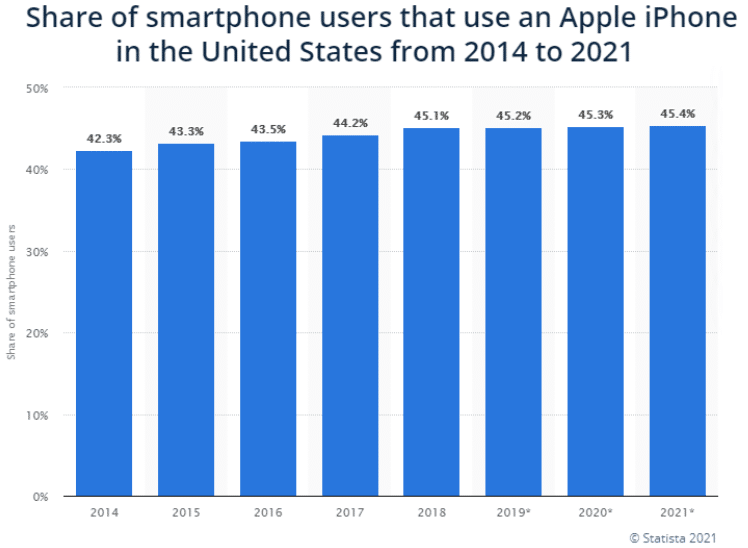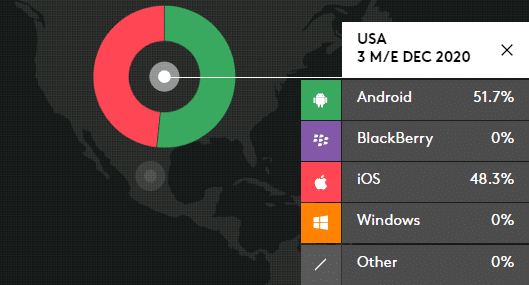It’s inevitable, Facebook is frantically preparing for the impact of Apple’s latest update in the coming weeks. With the release of iOs 14, Apple will require all App Store applications to display a notification to iOS 14 users conformingly to the AppTracking Transparency (ATT) framework.
The update will have major repercussions on companies advertising on the web and via mobile applications. Once the changes go into effect, platform advertising tools will be hit hard by data sharing limitations.

There are currently more than 100 million iPhone users in the United States, representing nearly 45% of all smartphone users in the country. In North America, Apple holds a dominating 52% of the market.

In the United States, the kantar study confirms that iOS accounted for nearly half of the active operating systems on smartphones in December 2020.
The Impact of iOS 14
The AppTrackingTransparency System (ATT)
All App Store applications will require user permission to use data from third-party apps and websites via Apple’s ATT. What we can expect from the ATT:
- Less data collection will reduce targeting quality and accuracy.
- Conversions from advertising platforms will decrease, reducing campaign optimization; consideration events (product views, adds to cart) and retargeting audiences will increase.
Apple disrupts advertising platforms with Private Click Measurement (PCM)
PCM restricts, limits, and aggregates the data shared between companies and platforms, limiting the measurement of app-to-web conversions. Decreasing web or app conversions for iOS users will yield incomplete, less effective campaign results than they really are for advertisers.
Facebook presents Aggregated Event Measurement
Unsatisfied with having to deal with incomplete or partial data, Facebook has replicated and implemented a new advertising system: Aggregated Event Measurement. Facebook states this “will help measure campaign performance in a way that is consistent with consumers’ agreement concerning their data.” What to remember:
- Advertisers will be limited to 8 conversion events per domain name (including standard and custom events) for optimization purposes.
- Facebook will initially configure conversion events according to industry-based relevance. These will then be ranked based on campaign spending over the last 28 days.
- Changing configuration will be available via the Events Manager (if necessary).
- When a user completes several events (e.g. “Add to Cart” and “Buy”), only the highest priority event will be reported.
Targeting and Dissemination
- Default attribution windows go from 7 days for clicks and 1 day for views to 7 days for clicks only, for all conversions and catalog sales objectives campaigns. Advertisers should expect their campaigns to be less effective compared to previously recorded performances.
-
Expect the similar audience size of website/app events to decrease due to iOS 14 user data losses.- Advertisers using dynamic ads for retargeting should also expect lower performance and audience size due to event losses.
Performance measurement and reporting
Expect an estimated delay of 24 to 48 hours when an iOS user performs a conversion.
- Expect an estimated delay of 24 to 48 hours when an iOS user performs a conversion.
- Website/app conversion events will now be reported to the platform when they occur, not at the time of advertising impressions.
- Facebook will no longer support 28-day click-based or 28 and 7-day view-based attribution windows. Attribution windows will only be available as 7 days for clicks and 1 day for views.
- Some data from website/app conversion events will no longer be available, including demographic data such as age, gender, and users’ region.
Actions to be implemented
- Check your domain name via Facebook Manager. Find out how to verify your Facebook ads domain name here :
About domain verification in Business Manager
- Prepare to operate and define a maximum of 8 conversion events per domain name (buy, add to cart, product view, etc.).
- Anticipate changes to attribution windows and update automated rules if necessary. By default, they are now modified by Facebook.
- Identify campaign optimization strategies that may require testing, such as alternative audience options or different bidding strategies.
A Solution to the Social Dilemma?
Implementing iOS 14 has triggered a very public feud between Facebook and Apple, while privacy versus ad targeting issues continue to resonate in the marketing industry.
Ultimately, advertising campaign results will no longer be consistent with reality. They will be assisted and improved by algorithms using artificial intelligence. Online advertising, which uses reliable data compared to traditional media such as television, radio and print, is losing its cutting edge.
Facebook is not the only company that Apple’s new features will affect: Snapchat, TikTok, Twitter, and Pinterest will also have to cope with these changes – to name a few. To limit further repercussions, we can anticipate attempts to withhold events of users who refuse ad tracking.
Co-author: Sarah CHAMBERLAND
Author: Ulysse VAQUER
Sources:
Joon Loomer: iOS 14 and Facebook Ads: What We Know
Preparing our partners for iOS 14: Mobile Web
How Apple’s iOS 14 Release May Affect Your Ads and Reporting
Facebook Pixel Updates for Apple’s iOS 14 Requirements
Foxwelldigital: Facebook Advertising and iOS14: A Guide
iOS 14.3 et Facebook Ads : Tout ce qu’il faut savoir

